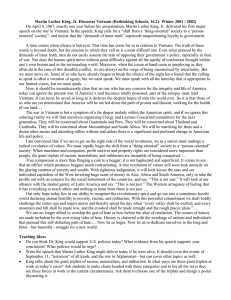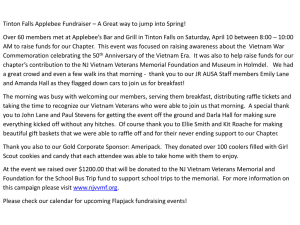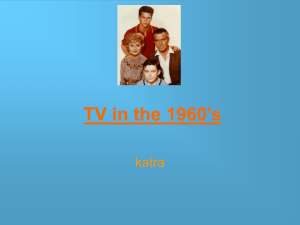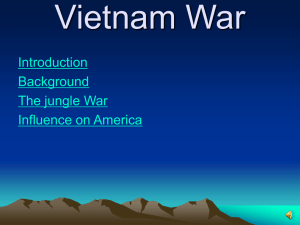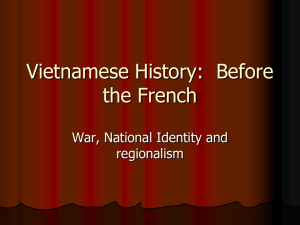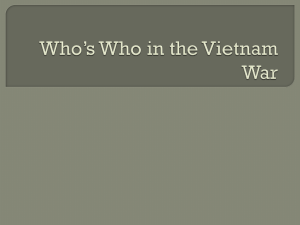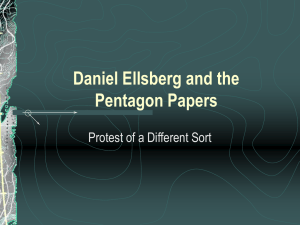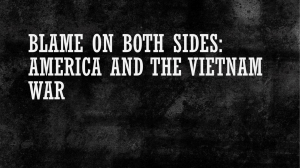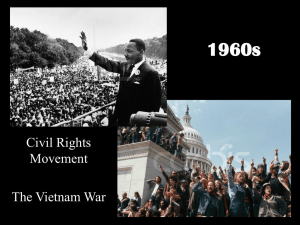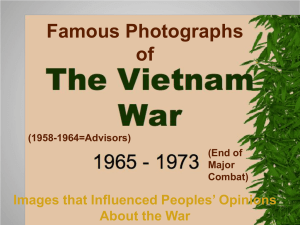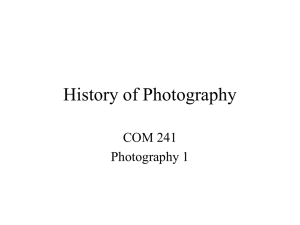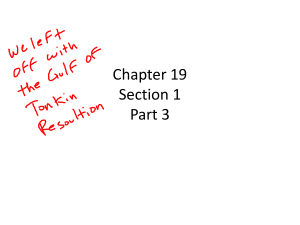Beyond Vietnam -- A Time to Break Silence Martin Luther King Jr
advertisement
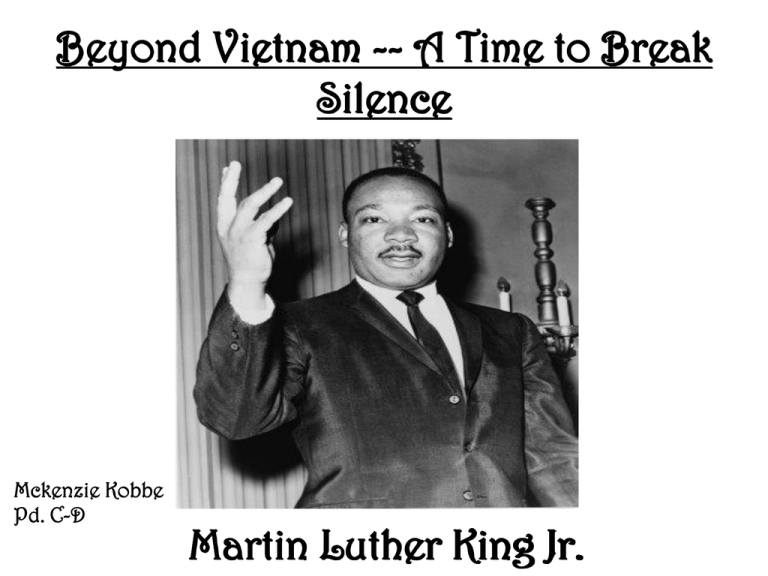
Beyond Vietnam -- A Time to Break Silence Mckenzie Kobbe Pd. C-D Martin Luther King Jr. Biography ● ● Martin Luther King, Jr. was born on January 15, 1929, in Atlanta. Always a strong worker for civil rights for members of his race, King was a member of the executive committee of the National Association for the Advancement of Colored People, the leading organization of its kind in the nation. Achievements ● ● ● Dr. King was awarded at least 50 honorary degrees from colleges and universities in the U.S. and elsewhere. King and his wife were also awarded the Congressional Gold Medal in 2004. At the age of thirty-five, Martin Luther King, Jr., was the youngest man to have received the Nobel Peace Prize. Historical Perspective In 1965 King began to publicly express doubts about the Vietnam War. He spoke strongly against the U.S.'s role in the war, arguing that the U.S. was in Vietnam "to occupy it as an American colony" and calling the U.S. government "the greatest purveyor of violence in the world today". He also connected the war with economic injustice, arguing that the country needed serious moral change Impact The speech provoked a torrent of criticism. Many editorial writers and political commentators chided King for connecting two issues—civil rights and Vietnam—that they thought should be separate and distinct. The New York Times, for example, rebuked King for damaging both the civil rights and the peace movement. Other observers denounced King for adopting the views of America’s enemies in Vietnam. Theme “Here is the true meaning and value of compassion and nonviolence, when it helps us to see the enemy's point of view, to hear his questions, to know his assessment of ourselves. For from his view we may indeed see the basic weaknesses of our own condition, and if we are mature, we may learn and grow and profit from the wisdom of the brothers who are called the opposition.” Key Points “At this point I should make it clear that while I have tried in these last few minutes to give a voice to the voiceless in Vietnam and to understand the arguments of those who are called "enemy," I am as deeply concerned about our own troops there as anything else.” Even though King believes that we should care for other people and walk in their shoes be still is very concerned about our own troops as well. Key Points “A true revolution of values will lay hand on the world order and say of war, "This way of settling differences is not just." In this key point King states that the way that we settle our differences with others is not just nor appropriate. There has to be another way of settling things peacefully rather than with bloodshed and death. Key Points “We can no longer afford to worship the god of hate or bow before the altar of retaliation. The oceans of history are made turbulent by the ever-rising tides of hate. And history is cluttered with the wreckage of nations and individuals that pursued this selfdefeating path of hate.” In this key point he is saying that we can no longer worship hating others, we cannot love retaliation. Events in the past have been made remarkably worse due to hate which resulted in the wreckage of nations. Individuals that pursued the path of hate led to their own defeats. Key Points Somehow this madness must cease. We must stop now. I speak as a child of God and brother to the suffering poor of Vietnam. I speak for those whose land is being laid waste, whose homes are being destroyed, whose culture is being subverted. I speak of the -- for the poor of America who are paying the double price of smashed hopes at home, and death and corruption in Vietnam. I speak as a citizen of the world, for the world as it stands aghast at the path we have taken. In this key point King states that the madness must stop. Speaking on behalf of the poor and suffering in Vietnam, speaking on behalf of those who have lost their homes and their lives, speaking on behalf of the citizens of the world, the war must stop. Key Points The world now demands a maturity of America that we may not be able to achieve. It demands that we admit that we have been wrong from the beginning of our adventure in Vietnam, that we have been detrimental to the life of the Vietnamese people. The situation is one in which we must be ready to turn sharply from our present ways. In this key point he states that the world demands maturity from us. We have to admit from the beginning that we were wrong with our adventure in Vietnam and that we have to change ourselves to change the situation in front of us. “We are now faced with the fact, my friends, that tomorrow is today. We are confronted with the fierce urgency of now. In this unfolding conundrum of life and history, there is such a thing as being too late. Procrastination is still the thief of time. Life often leaves us standing bare, naked, and dejected with a lost opportunity. The tide in the affairs of men does not remain at flood -- it ebbs. We may cry out desperately for time to pause in her passage, but time is adamant to every plea and rushes on. Over the bleached bones and jumbled residues of numerous civilizations are written the pathetic words, "Too late." There is an invisible book of life that faithfully records our vigilance or our neglect. Omar Khayyam is right: "The moving finger writes, and having writ moves on. We still have a choice today: nonviolent coexistence or violent coannihilation. We must move past indecision to action. We must find new ways to speak for peace in Vietnam and justice throughout the developing world, a world that borders on our doors. If we do not act, we shall surely be dragged down the long, dark, and shameful corridors of time reserved for those who possess power without compassion, might without morality, and strength without sight.” If we will but make the right choice, we wil Martin Luther King Jr. A Time To Break Silence Bonus Parallelism - we will be able to transform this pending cosmic elegy into a creative psalm of peace. If we will make the right choice, we will be able to transform the jangling discords of our world... If we will but make the right choice, we will be able to speed up the day... Rhetorical Questions - Shall we say the odds are too great? Shall we tell them the struggle is too hard? Will our message be that the forces of American life militate against their arrival as full men, and we send our deepest regrets? Parallelism - A true revolution of values will soon cause us to question the fairness and justice of many of our past and present policies...A true revolution of values will soon look uneasily on the glaring contrast of poverty and wealth... Restatement - life often leaves us standing bare, naked, and dejected Bonus Rhetorical Questions - Is our nation planning to build on political myth again, and then shore it up upon the power of new violence? Parallelism - We have destroyed their two most cherished institutions: the family and the village. We have destroyed their land and their crops. We have cooperated in the crushing... Persuasive Appeal To Emotion - If we will make the right choice, we will be able to transform the jangling discords of our world into a beautiful symphony of brotherhood. Persuasive Appeal To Reason - And history is cluttered with the wreckage of nations and individuals that pursued this self-defeating path of hate. As Arnold Toynbee says: Love is the ultimate force that makes for the saving choice of life and good against the damning choice of death and evil. Therefore the first hope in our inventory
